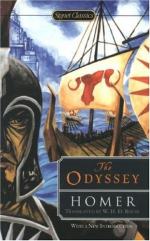But it is not on words only that grammarians, mere grammarians, will exercise their elaborate and often tiresome ingenuity. Binding down an heroic or dramatic poet to the block upon which they have previously dissected his words and sentences, they proceed to use the axe and the pruning knife by wholesale; and, inconsistent in everything but their wish to make out a case of unlawful affiliation, they cut out book after book, passage after passage, till the author is reduced to a collection of fragments, or till those who fancied they possessed the works of some great man, find that they have been put off with a vile counterfeit got up at second hand. If we compare the theories of Knight, Wolf, Lachmann; and others, we shall feel better satisfied of the utter uncertainty of criticism than of the apocryphal position of Homer. One rejects what another considers the turning-point of his theory. One cuts a supposed knot by expunging what another would explain by omitting something else.
Nor is this morbid species of sagacity by any means to be looked upon as a literary novelty. Justus Lipsius, a scholar of no ordinary skill, seems to revel in the imaginary discovery, that the tragedies attributed to Seneca are by four different authors. Now, I will venture to assert, that these tragedies are so uniform, not only in their borrowed phraseology—a phraseology with which writers like Boethius and Saxo Grammaticus were more charmed than ourselves—in their freedom from real poetry, and last, but not least, in an ultra-refined and consistent abandonment of good taste, that few writers of the present day would question the capabilities of the same gentleman, be he Seneca or not, to produce not only these, but a great many more equally bad. With equal sagacity, Father Hardouin astonished the world with the startling announcement that the AEneid of Virgil, and the satires of Horace, were literary deceptions. Now, without wishing to say one word of disrespect against the industry and learning—nay, the refined acuteness—which scholars like Wolf have bestowed upon this subject, I must express my fears, that many of our modern Homeric theories will become matter for the surprise and entertainment, rather than the instruction, of posterity. Nor can I help thinking that the literary history of more recent times will account for many points of difficulty in the transmission of the Iliad and Odyssey to a period so remote from that of their first creation.
I have already expressed my belief that the labours of Peisistratus were of a purely editorial character; and there seems no more reason why corrupt and imperfect editions of Homer may not have been abroad in his day, than that the poems of Valerius Flaccus and Tibullus should have given so much trouble to Poggio, Scaliger, and others. But, after all, the main fault in all the Homeric theories is, that they demand too great a sacrifice of those feelings to which poetry most powerfully appeals, and which are its most fitting




